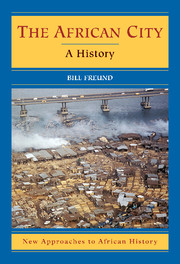Book contents
- Frontmatter
- Contents
- PREFACE
- 1 Urban Life Emerges in Africa
- 2 African Cities and the Emergence of a World Trading Economy
- 3 Colonialism and Urbanisation
- 4 Cities in Revolt: The Long-Term Crisis of South African Urbanism
- 5 The Post-Colonial African City
- 6 Globalisation and the African City: Touba, Abidjan, Durban
- INDEX
2 - African Cities and the Emergence of a World Trading Economy
Published online by Cambridge University Press: 05 June 2012
- Frontmatter
- Contents
- PREFACE
- 1 Urban Life Emerges in Africa
- 2 African Cities and the Emergence of a World Trading Economy
- 3 Colonialism and Urbanisation
- 4 Cities in Revolt: The Long-Term Crisis of South African Urbanism
- 5 The Post-Colonial African City
- 6 Globalisation and the African City: Touba, Abidjan, Durban
- INDEX
Summary
This chapter tries to explore in greater depth the impact of the waves of commercial penetration with their primary impetus in Europe which impacted in Africa from the fifteenth century onwards. In the previous chapter, we observed essentially commercial forms of urbanisation that can be linked to diffusion and incorporation. The influence of Greek, Punic, and then Roman urbanism in northern Africa was followed by the far more widely diffused Islamic impact. The Islamic impact, constantly reinforced with wide-ranging commercial linkages like the others, provided as well a model, or set of models, for the good society with a strong urban element. From early in the sixteenth century, Ottoman Turkish dominance was established in North Africa representing some significant changes; Morocco alone remained a sovereign state. However, the Islamic urban tradition was very well established and only altered to some extent. Thus we are here dealing with continuation rather than a total break. Contacts with European merchant capital and consequent responses largely represented the addition of a different layer of urban activity and urban life, although sometimes they did take place in regions of Africa where such contacts had little precedent.
It may be useful to map out the terrain of this chapter chronologically. From the fifteenth century and well into the seventeenth, the dominant European country in contact with Africa was Portugal. European commercial and political interests in Africa were variable and open-ended during this phase.
- Type
- Chapter
- Information
- The African CityA History, pp. 37 - 64Publisher: Cambridge University PressPrint publication year: 2007



